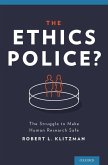Peter A. Singer / A. M. Viens (eds.)
The Cambridge Textbook of Bioethics
Herausgeber: Singer, Peter A; Viens, A M
Peter A. Singer / A. M. Viens (eds.)
The Cambridge Textbook of Bioethics
Herausgeber: Singer, Peter A; Viens, A M
- Broschiertes Buch
- Merkliste
- Auf die Merkliste
- Bewerten Bewerten
- Teilen
- Produkt teilen
- Produkterinnerung
- Produkterinnerung
A comprehensive reference providing an approach to problems of biomedical ethics in the clinical setting.
Andere Kunden interessierten sich auch für
![Bioethics and the Future of Stem Cell Research Bioethics and the Future of Stem Cell Research]() Hyun InsooBioethics and the Future of Stem Cell Research52,99 €
Hyun InsooBioethics and the Future of Stem Cell Research52,99 €![The Cambridge Encyclopedia of Darwin and Evolutionary Thought The Cambridge Encyclopedia of Darwin and Evolutionary Thought]() The Cambridge Encyclopedia of Darwin and Evolutionary Thought268,99 €
The Cambridge Encyclopedia of Darwin and Evolutionary Thought268,99 €![The Ethics Police? The Ethics Police?]() Robert KlitzmanThe Ethics Police?64,99 €
Robert KlitzmanThe Ethics Police?64,99 €![Future of Bioethics Future of Bioethics]() Howard BrodyFuture of Bioethics101,99 €
Howard BrodyFuture of Bioethics101,99 €![Feeding the World Well Feeding the World Well]() Feeding the World Well76,99 €
Feeding the World Well76,99 €![Life, Liberty, and the Defense of Dignity Life, Liberty, and the Defense of Dignity]() Leon KassLife, Liberty, and the Defense of Dignity24,99 €
Leon KassLife, Liberty, and the Defense of Dignity24,99 €![Human Dignity in Bioethics and Biolaw Human Dignity in Bioethics and Biolaw]() David BeyleveldHuman Dignity in Bioethics and Biolaw224,99 €
David BeyleveldHuman Dignity in Bioethics and Biolaw224,99 €-
-
-
A comprehensive reference providing an approach to problems of biomedical ethics in the clinical setting.
Hinweis: Dieser Artikel kann nur an eine deutsche Lieferadresse ausgeliefert werden.
Hinweis: Dieser Artikel kann nur an eine deutsche Lieferadresse ausgeliefert werden.
Produktdetails
- Produktdetails
- Verlag: Cambridge University Press
- Seitenzahl: 553
- Erscheinungstermin: 31. Januar 2008
- Englisch
- Abmessung: 244mm x 189mm x 32mm
- Gewicht: 1052g
- ISBN-13: 9780521694438
- ISBN-10: 0521694434
- Artikelnr.: 22784122
- Herstellerkennzeichnung
- Libri GmbH
- Europaallee 1
- 36244 Bad Hersfeld
- gpsr@libri.de
- Verlag: Cambridge University Press
- Seitenzahl: 553
- Erscheinungstermin: 31. Januar 2008
- Englisch
- Abmessung: 244mm x 189mm x 32mm
- Gewicht: 1052g
- ISBN-13: 9780521694438
- ISBN-10: 0521694434
- Artikelnr.: 22784122
- Herstellerkennzeichnung
- Libri GmbH
- Europaallee 1
- 36244 Bad Hersfeld
- gpsr@libri.de
Peter A. Singer is Director Emeritus, University of Toronto Joint Centre for Bioethics; Senior Scientist, McLaughlin-Rotman Centre for Global Health, University Health Network; and Professor of Medicine, University of Toronto.
A. M. Viens is a Senior Scholar at Hertford College, Oxford, and a Doctoral Student in the Faculty of Philosophy at the University of Oxford.
A. M. Viens is a Senior Scholar at Hertford College, Oxford, and a Doctoral Student in the Faculty of Philosophy at the University of Oxford.
1. Introduction
Part I. Information Problems: 2. Consent
3. Capacity
4. Disclosure
5. Voluntariness
6. Truth-telling
7. Confidentiality
Part II. End of Life Care: 8. Quality end of life care
9. Substitute decision-making
10. Advanced care planning
11. Euthanasia and assisted suicide
12. Conflict in the health care setting at the end of life
13. Brain death
Part III. Pregnant Women and Children: 14. Ethics dilemmas in the care of pregnant women: rethinking 'maternal-fetal conflicts'
15. Pre-natal testing and newborn screening
16. Assisted reproduction
17. Respectful involvement of children in medical decision-making
18. Non-therapeutic paediatric interventions
19. Child abuse and neglect
Part IV. Genetics and Biotechnology: 20. Organ transplantation
21. Regenerative medicine
22. Genetic testing and screening
23. Bio-banking
24. Behavioural genetics
Part V. Research Ethics: 25. Research Ethics
26. Innovation in medical care: Examples from surgery
27. Clinical trials
28. Epidemiological research
29. Clinical research and the physician-patient relationship: the dual roles of physician and researcher
30. Financial conflict of interest in medical research
31. Embryo and fetal research
Part VI. Health Systems and Institutions : 32. Organizational ethics
33. Priority setting
34. Disclosure of medical error
35. Conflict of interest in education and patient care
36. Public health ethics
37. Emergency and disaster scenarios
38. Rural health care ethics
39. Community health care ethics
Part VII. Using Clinical Ethics to Make an Impact in Health Care: 40. Clinical ethics and systems thinking
41. Innovative strategies to improve effectiveness in clinical Ethics
42. Teaching bioethics to medical students and postgraduate trainees in the clinical setting
Part VIII. Global Health Ethics: 43. Global health ethics and cross-cultural considerations in bioethics
44. Physician participation in torture
45. Access to medicines and the role of corporate social responsibility: the need to craft a global pharmaceutical system with integrity
46. Global health and non-ideal justice
Part IX. Religious and Cultural Perspectives in Bioethics: 47. Aboriginal bioethics
48. Buddhist bioethics
49. Chinese Bioethics
50. Hindu and Sikh bioethics
51. Islamic boethics
52. Jehovah's Witness bioethics
53. Jewish bioethics
54. Protestant bioethics
55. Roman Catholic bioethics
Part X. Speciality Bioethics: 56. Surgical ethics
57. Anaesthesiology ethics
58. Critical and intensive care ethics
59. Emergency and trauma medicine ethics
60. Primary care ethics
61. Infectious diseases ethics
62. Psychiatric ethics
63. Neuroethics
64. Pharmacy ethics
65. Alternative and complementary care ethics.
Part I. Information Problems: 2. Consent
3. Capacity
4. Disclosure
5. Voluntariness
6. Truth-telling
7. Confidentiality
Part II. End of Life Care: 8. Quality end of life care
9. Substitute decision-making
10. Advanced care planning
11. Euthanasia and assisted suicide
12. Conflict in the health care setting at the end of life
13. Brain death
Part III. Pregnant Women and Children: 14. Ethics dilemmas in the care of pregnant women: rethinking 'maternal-fetal conflicts'
15. Pre-natal testing and newborn screening
16. Assisted reproduction
17. Respectful involvement of children in medical decision-making
18. Non-therapeutic paediatric interventions
19. Child abuse and neglect
Part IV. Genetics and Biotechnology: 20. Organ transplantation
21. Regenerative medicine
22. Genetic testing and screening
23. Bio-banking
24. Behavioural genetics
Part V. Research Ethics: 25. Research Ethics
26. Innovation in medical care: Examples from surgery
27. Clinical trials
28. Epidemiological research
29. Clinical research and the physician-patient relationship: the dual roles of physician and researcher
30. Financial conflict of interest in medical research
31. Embryo and fetal research
Part VI. Health Systems and Institutions : 32. Organizational ethics
33. Priority setting
34. Disclosure of medical error
35. Conflict of interest in education and patient care
36. Public health ethics
37. Emergency and disaster scenarios
38. Rural health care ethics
39. Community health care ethics
Part VII. Using Clinical Ethics to Make an Impact in Health Care: 40. Clinical ethics and systems thinking
41. Innovative strategies to improve effectiveness in clinical Ethics
42. Teaching bioethics to medical students and postgraduate trainees in the clinical setting
Part VIII. Global Health Ethics: 43. Global health ethics and cross-cultural considerations in bioethics
44. Physician participation in torture
45. Access to medicines and the role of corporate social responsibility: the need to craft a global pharmaceutical system with integrity
46. Global health and non-ideal justice
Part IX. Religious and Cultural Perspectives in Bioethics: 47. Aboriginal bioethics
48. Buddhist bioethics
49. Chinese Bioethics
50. Hindu and Sikh bioethics
51. Islamic boethics
52. Jehovah's Witness bioethics
53. Jewish bioethics
54. Protestant bioethics
55. Roman Catholic bioethics
Part X. Speciality Bioethics: 56. Surgical ethics
57. Anaesthesiology ethics
58. Critical and intensive care ethics
59. Emergency and trauma medicine ethics
60. Primary care ethics
61. Infectious diseases ethics
62. Psychiatric ethics
63. Neuroethics
64. Pharmacy ethics
65. Alternative and complementary care ethics.
1. Introduction
Part I. Information Problems: 2. Consent
3. Capacity
4. Disclosure
5. Voluntariness
6. Truth-telling
7. Confidentiality
Part II. End of Life Care: 8. Quality end of life care
9. Substitute decision-making
10. Advanced care planning
11. Euthanasia and assisted suicide
12. Conflict in the health care setting at the end of life
13. Brain death
Part III. Pregnant Women and Children: 14. Ethics dilemmas in the care of pregnant women: rethinking 'maternal-fetal conflicts'
15. Pre-natal testing and newborn screening
16. Assisted reproduction
17. Respectful involvement of children in medical decision-making
18. Non-therapeutic paediatric interventions
19. Child abuse and neglect
Part IV. Genetics and Biotechnology: 20. Organ transplantation
21. Regenerative medicine
22. Genetic testing and screening
23. Bio-banking
24. Behavioural genetics
Part V. Research Ethics: 25. Research Ethics
26. Innovation in medical care: Examples from surgery
27. Clinical trials
28. Epidemiological research
29. Clinical research and the physician-patient relationship: the dual roles of physician and researcher
30. Financial conflict of interest in medical research
31. Embryo and fetal research
Part VI. Health Systems and Institutions : 32. Organizational ethics
33. Priority setting
34. Disclosure of medical error
35. Conflict of interest in education and patient care
36. Public health ethics
37. Emergency and disaster scenarios
38. Rural health care ethics
39. Community health care ethics
Part VII. Using Clinical Ethics to Make an Impact in Health Care: 40. Clinical ethics and systems thinking
41. Innovative strategies to improve effectiveness in clinical Ethics
42. Teaching bioethics to medical students and postgraduate trainees in the clinical setting
Part VIII. Global Health Ethics: 43. Global health ethics and cross-cultural considerations in bioethics
44. Physician participation in torture
45. Access to medicines and the role of corporate social responsibility: the need to craft a global pharmaceutical system with integrity
46. Global health and non-ideal justice
Part IX. Religious and Cultural Perspectives in Bioethics: 47. Aboriginal bioethics
48. Buddhist bioethics
49. Chinese Bioethics
50. Hindu and Sikh bioethics
51. Islamic boethics
52. Jehovah's Witness bioethics
53. Jewish bioethics
54. Protestant bioethics
55. Roman Catholic bioethics
Part X. Speciality Bioethics: 56. Surgical ethics
57. Anaesthesiology ethics
58. Critical and intensive care ethics
59. Emergency and trauma medicine ethics
60. Primary care ethics
61. Infectious diseases ethics
62. Psychiatric ethics
63. Neuroethics
64. Pharmacy ethics
65. Alternative and complementary care ethics.
Part I. Information Problems: 2. Consent
3. Capacity
4. Disclosure
5. Voluntariness
6. Truth-telling
7. Confidentiality
Part II. End of Life Care: 8. Quality end of life care
9. Substitute decision-making
10. Advanced care planning
11. Euthanasia and assisted suicide
12. Conflict in the health care setting at the end of life
13. Brain death
Part III. Pregnant Women and Children: 14. Ethics dilemmas in the care of pregnant women: rethinking 'maternal-fetal conflicts'
15. Pre-natal testing and newborn screening
16. Assisted reproduction
17. Respectful involvement of children in medical decision-making
18. Non-therapeutic paediatric interventions
19. Child abuse and neglect
Part IV. Genetics and Biotechnology: 20. Organ transplantation
21. Regenerative medicine
22. Genetic testing and screening
23. Bio-banking
24. Behavioural genetics
Part V. Research Ethics: 25. Research Ethics
26. Innovation in medical care: Examples from surgery
27. Clinical trials
28. Epidemiological research
29. Clinical research and the physician-patient relationship: the dual roles of physician and researcher
30. Financial conflict of interest in medical research
31. Embryo and fetal research
Part VI. Health Systems and Institutions : 32. Organizational ethics
33. Priority setting
34. Disclosure of medical error
35. Conflict of interest in education and patient care
36. Public health ethics
37. Emergency and disaster scenarios
38. Rural health care ethics
39. Community health care ethics
Part VII. Using Clinical Ethics to Make an Impact in Health Care: 40. Clinical ethics and systems thinking
41. Innovative strategies to improve effectiveness in clinical Ethics
42. Teaching bioethics to medical students and postgraduate trainees in the clinical setting
Part VIII. Global Health Ethics: 43. Global health ethics and cross-cultural considerations in bioethics
44. Physician participation in torture
45. Access to medicines and the role of corporate social responsibility: the need to craft a global pharmaceutical system with integrity
46. Global health and non-ideal justice
Part IX. Religious and Cultural Perspectives in Bioethics: 47. Aboriginal bioethics
48. Buddhist bioethics
49. Chinese Bioethics
50. Hindu and Sikh bioethics
51. Islamic boethics
52. Jehovah's Witness bioethics
53. Jewish bioethics
54. Protestant bioethics
55. Roman Catholic bioethics
Part X. Speciality Bioethics: 56. Surgical ethics
57. Anaesthesiology ethics
58. Critical and intensive care ethics
59. Emergency and trauma medicine ethics
60. Primary care ethics
61. Infectious diseases ethics
62. Psychiatric ethics
63. Neuroethics
64. Pharmacy ethics
65. Alternative and complementary care ethics.








